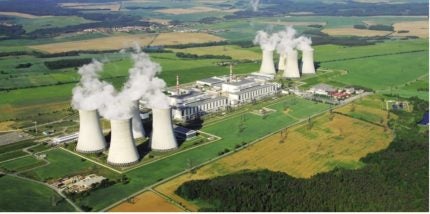
Czech state-owned power company, ČEZ, has submitted to the government its evaluation of offers from the interested companies for construction of up to four nuclear units at the Dukovany and Temelín NPPs. France’s EDF and the Korea Hydro & Nuclear Power (KHNP) submitted documents at the end of April. In late January, the government had amended the tender to binding offers for up to four reactors, rather than just one as specified in the original tender. It invited bids only from EDF and KHNP. The third original bidder, US-based Westinghouse, was not included because it “did not meet the necessary conditions”. EDF is offering its EPR1200 reactor and KHNP its APR1000. Westinghouse was offering its AP1000.
Elektrárna Dukovany II (EDU II), a wholly owned subsidiary of ČEZ, submitted its evaluation report to the Ministry of Industry & Trade (MIT) for the construction of an initial new nuclear unit at Dukovany. Its report recommended the ranking, proposing its preferred supplier of a new nuclear unit or units. The government will now issue its statement naming the party which whom ČEZ will negotiate the final form of the contracts.
In the previous months, more than 180 experts from ČEZ Group and other organisations scrutinised the bids, evaluating the financial, commercial, and technical aspects. “The bid evaluation model was based on recommendations of the International Atomic Energy Agency (IAEA),” said Board Member and head of ČEZ’s New Energy Division Tomáš Pleskač. “All price inputs and risks have been quantified. Both offers were compared according to the same criterion, namely to the price per one megawatt hour generated, at which each contender’s new unit would generate electricity.”
Minister of Industry and Trade Jozef Síkela confirmed that EDU II had submitted its evaluation report. “I can confirm that we have received the evaluation report from ČEZ Group,” he said. “The government now has an opportunity to express its opinion on the report from the perspective of national security interests. We will announce the selection of the preferred contender in July and inform about how we will use the option for the construction of additional nuclear units in Dukovany and Temelín.”
The contracts are expected to be finalised this year and ready for signature by 31 March 2025. If the form of the contracts starts to significantly diverge from the bid submitted, the second bidder could be asked to re-enter negotiations.
Once the contracts are signed, thorough drafting of the project documentation will follow, taking into account that the deadline for starting test operation of the first new unit is 2036.
ČEZ added that EDU II is working on other parts of the project. After the Ministry of the Environment issued an affirmative environmental impact assessment (EIA) in 2019, the project received a placement permit from the State Authority for Nuclear Safety, and authorisation for the unit from MIT. A zoning permit that still has to be finalised was issued on 30 October 2023.
Prime Minister Petr Fiala said recently that the number of nuclear units should be made clear by the end of August at the latest, adding that the planned schedule would not change. Trade minister Sikela said in an interview with Radiožurnál that he would not immediately conclude a contract for all four possible units. He suggested that two units might be possible in the event of a binding arrangement with the municipality.
At the end of April, the government obtained a permit from the European Commission (EC), which enables ČEZ to provide financial assistance for the construction of one nuclear unit at Dukovany. However, if the government decides to build more, it will have to re-apply for permission to the EC.
The government had proposed a public support package for new nuclear by granting direct price support in the form of a power purchasing contract with a state-owned special purpose vehicle, ensuring stable revenues for 40 years. It is also proposing a subsidised state loan to cover most of the construction costs as well as insuring against unforeseen events or policy changes. A clawback mechanism would ensure that additional gains generated by the project would be shared with the Czech state.
Four VVER-440 units are currently in operation at the Dukovany site, which began operating between 1985 and 1987. Two VVER-1000 units are in operation at Temelín, which began operation in 2000 and 2002. The Dukovany units will be decommissioned no later than 2045-2047.
Nuclear currently provides about one-third of its electricity. Four VVER-440 units at Dukovany began operating between 1985 and 1987, and the two VVER-1000 units at Temelín began operation in 2000 and 2002.






